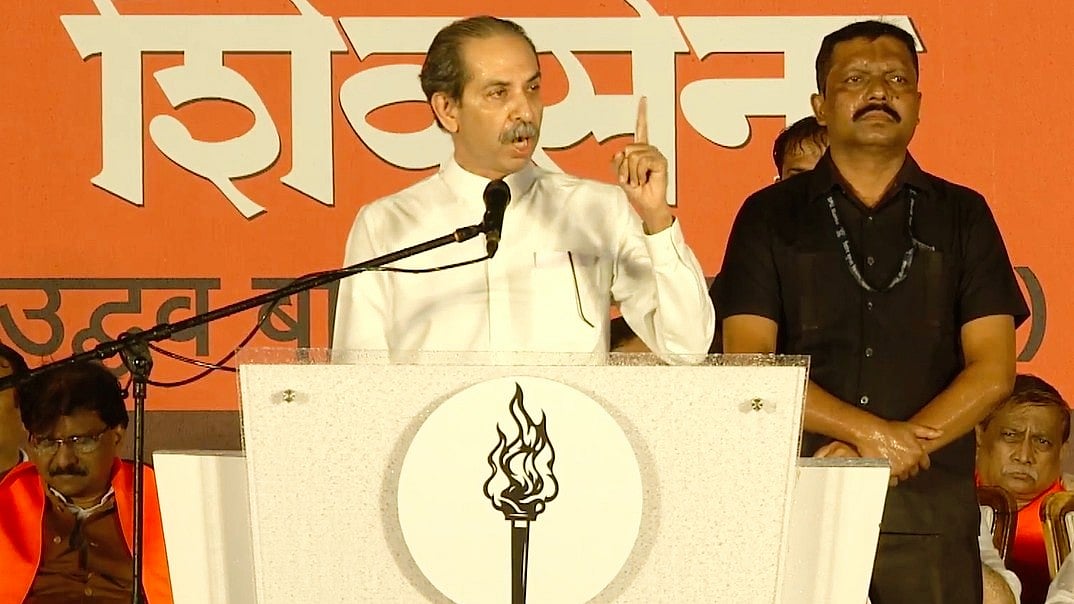POLITICS
Fighting for rights, justice becoming act of treason: Uddhav at Dussehra rally
Remarks come against backdrop of Sonam Wangchuk’s detention under National Security Act after deadly clashes in Ladakh

At his annual Dussehra rally in Mumbai on Thursday, Shiv Sena (UBT) chief Uddhav Thackeray launched a blistering critique of the BJP, using the arrest of Ladakhi climate activist Sonam Wangchuk as evidence that India’s democratic space is steadily shrinking. Thackeray argued that “fighting for rights and justice is becoming an act of treason in the country”, warning that dissent is increasingly criminalised under the present regime.
The remarks came against the backdrop of Wangchuk’s detention under the National Security Act (NSA) after clashes in Leh on 24 September left four people dead and scores injured. The violence erupted during a shutdown called by the Leh Apex Body (LAB), which has been demanding statehood for Ladakh and the extension of the Sixth Schedule of the Constitution to protect local land and cultural rights.
Wangchuk, known globally for his environmental innovation and activism, has been a leading figure in this movement. His arrest and transfer to Jodhpur jail have been widely criticised, adding to concerns that the government is silencing legitimate dissent.
Thackeray seized on the symbolism of Wangchuk’s case to argue that the BJP equates opposition with disloyalty. “This government has money to buy votes in Bihar but not for farmers in Maharashtra whose crops were destroyed by floods,” he said, demanding loan waivers and financial assistance for rain-hit cultivators. By contrasting relief for farmers with alleged political spending, Thackeray positioned the BJP as prioritising electoral manoeuvres over governance.
Published: undefined
In one of his sharper lines, Thackeray likened the BJP to an amoeba — “causing stomach ache when it enters the body and disturbing peace when it enters society.” The metaphor fit into his larger accusation that the party thrives on social polarisation. With civic elections in Mumbai approaching, he charged the BJP with once again attempting to engineer a Hindu-Muslim divide, a strategy that has played out repeatedly in Maharashtra’s urban politics.
He also extended his critique to the Rashtriya Swayamsevak Sangh (RSS), which marked its centenary with a Vijayadashami rally in Nagpur the same day. “Are you satisfied with the poisonous fruits born from the RSS’ 100-year effort?” Thackeray asked RSS chief Mohan Bhagwat, casting the Sangh’s long project as responsible for the present political climate of division and authoritarianism.
The rally also underscored Thackeray’s current alliances. He reiterated that his tie-up with Raj Thackeray’s Maharashtra Navnirman Sena was built to last, remarking, “We came together to stay together.” This assertion carries weight in the shifting balance of state politics since the 2022 Shiv Sena split, when Eknath Shinde aligned with the BJP to form government.
Published: undefined
Thackeray also pledged that if his faction captures the Brihanmumbai Municipal Corporation (BMC), it will release a 'White Paper' exposing what he described as the BJP’s “loot” of the civic body. The BMC, India’s wealthiest municipality, remains a vital source of both political clout and patronage networks, making its control a key battleground for all major parties.
While firmly rooted in Maharashtra’s political theatre, Thackeray’s message resonated beyond the state. In the wake of the 2024 Lok Sabha elections — which returned the BJP-led NDA to power but also revealed deeper fractures in opposition politics — his speech can be seen as part of the ongoing effort by regional leaders to craft a post-2024 narrative of resistance. By invoking Wangchuk’s detention, he tied local grievances to a larger concern: that India’s democratic ethos is being hollowed out by conflating dissent with disloyalty.
Thackeray’s attack on the RSS also carried national implications. By linking today’s governance practices directly to the Sangh’s ideological foundations, he raised questions not just about BJP rule, but about the nature of the republic itself.
With PTI inputs
Published: undefined
Follow us on: Facebook, Twitter, Google News, Instagram
Join our official telegram channel (@nationalherald) and stay updated with the latest headlines
Published: undefined